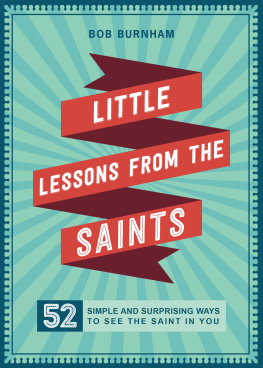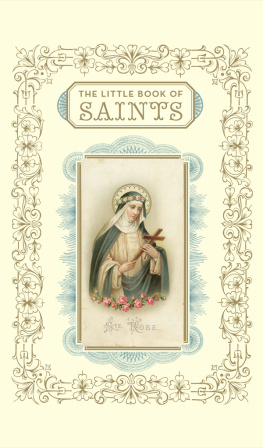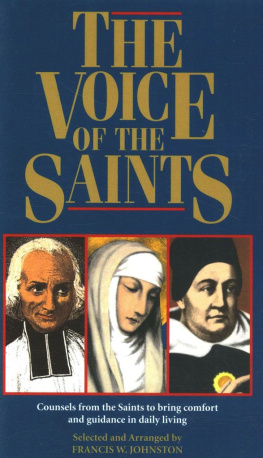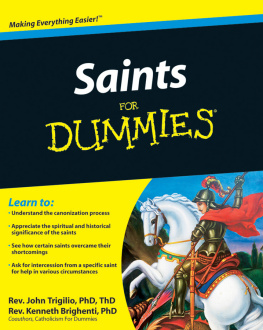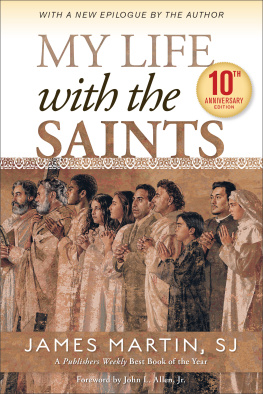
TO JSB AND MSB
CONTENTS
Ill admit it. I love the saints. Ive loved them for as long as I can remember. One of the first joys of my childhood was receiving a book about St. Francis of Assisi. (And one of my first great disappointments was not being chosen to play the role of St. Clare in our third-grade production of St. Franciss life.) I cant imagine life without the saints. I dont know what I would do without St. Anthony to help find lost objects, or St. Elizabeth Ann Seton to confer with about child-rearing, or Blessed Diana DAndalo to consult on maintaining friendships. I know my life would be diminished without a celestial shoulder or two to cry on occasionally or a heavenly companion to share an earthly joy.
But what is a saint?
Anyone who is in heaven is a saint, but a Saint with a capital S in the Catholic and Orthodox tradition is someone whose life so exemplifies holiness and virtue that the Church has officially declared them to be in heaven. (Interestingly, although thousands of people are officially said to be in heaven, not one single person has ever officially been declared to be in hell!)
The lengthy process by which a person is named a capital S saint is called canonization. If a person has shown great holiness in life, he or she may be called Venerable after death. This step in the saint-making process indicates the person may be honored. The next step is beatification. After more investigation and indisputable evidence of miracles worked through the persons intercession, a Venerable may be named Blessed and assigned an official feast dayusually the day of death (their birthday into heaven). Then, after more investigation and more miracles, a Blessed may finally be canonized and declared an official capital S saint. The only exception to the process is a martyr, a person who is killed for the faith. In those cases, the need for a miracle may be waived. The saints in this book, with a few notable exceptions such as Mother Teresa of Calcutta, are either official capital S saints or are in the process of becoming official saints.
So what are the saints really like?
All too often, we think of them as heavenly Goody Two-shoes who did nothing except pray, perform good deeds, and make every-one feel guilty for not living up to their example. While some of the saints did spend all (or most) of their time praying and doing good deeds (and probably making others feel guilty), the majority were real peoplewith all the foibles, eccentricities, and charm of real people.
Thats what makes the saints so appealingtheyre ordinary people with one extraordinary difference; theyve been so inflamed with the love of God that their entire lives are a celebration of Gods love and goodness. They were so passionately in love with God while they were living, theyre now believed to be permanently with God for all eternity in heaven.
In writing this book, it was my hope to share some of the saints successes and failures, joys and sorrows as an encouragement for your own spiritual journey. I hope that you come to discover, by their example, that we each have our own path of spiritual growth and development. The saints were never plaster statues on a heavenly assembly line. They made mistakes in everything from business deals to marriage. They suffered the same heartaches, illnesses, and sorrows that we suffer. And they experienced all the joys of everyday life. They didnt become saints because they were perfect; they became saints because they let God transform their imperfections.
I love the saints, not because of their sanctityalthough that is certainly importantbut because of their humanity. I hope through this book, you will find at least one heavenly friend to know and love. But more than that, I hope as you discover the love the saints had for God, you will also discover how much love God has for each and every one of us. And I pray that you will realize God is calling each and every one of us to become saints as well.
MARY, MOTHER OF JESUS
FIRST CENTURY
Appointment books. Planners. Calendars. We outline our present, plan our future, and review our past. We know exactly where we want to be and how we want to get there. And then it happensthe unexpected, the unplanned, the unforeseen. The death of a family member. A job change. A serious illness. Our neatly ordered lives are shattered and we are left holding the pieces.
How do we react when things happen that we cant control? Do we rail against the heavens, demanding answers, or do we accept, trusting that everything will work out according to divine plan?
Mary certainly wasnt expecting an angel to appear to her and ask if she was willing to become the mother of the Messiah. Naturally, she had a few questionslike, how can this happen when I am neither married nor involved in a sexual relationship? Yet once her questions were resolved, she answered Fiat (Let it be done to me according to Gods will). She was willing to trust, even when it entailed mystery and the unknown.
As we begin a new year, let us resolve to accept with joy the twists and turns life brings us. Let us open our hearts to the wonder of each new day and trust that our lives are unfolding the way they ought.
Do I have to be in control of everything? In what areas can I let others have their say?

TODAY, AND EVERY DAY, I WILL TRUST IN THE GOODNESS AND WISDOM OF LIFE.
ST. BASIL THE GREAT
329379
Do you sometimes feel you cant win for losing? St. Basil the Great could empathize. Archbishop of what is now southeastern Turkey and founder of what was probably the first monastery in Asia Minor, St. Basil was deeply embroiled in leading the fight against the Arians, who argued that Jesus was neither divine nor eternal. In his attempts to defend the faith, Basil was even accused of heresy himself. Frustrated and dismayed, he wrote, For my sins I seem to be unsuccessful in everything.
Often when lifes struggles sap our energy, we also feel unsuccessful in everything. Our past triumphs fade under the weight of the current failure, and we slip into self-pity. We are tempted to give up.
Even a saint as great as Basil the Great wasnt immune to such a temptation. Yet he didnt let his negative feelings rule his life. He continued preaching with such zeal that today he is considered one of the most eminent teachers of the Church.
St. Basil didnt surrender in the face of seeming failure. He kept going, even when he undoubtedly would rather have retreated to the sanctuary of his monastery. His life demonstrates that perseverance is just another name for success. When we feel tempted to give up, let us remember, as Charles Spurgeon said, By perseverance the snail reached the Ark. May we emulate the example of Basil the Great.
How do I react when I feel like a failure? What keeps me going when I feel the most discouraged?

I GIVE MYSELF CREDIT FOR ALL I HAVE ACCOMPLISHED.
ST. GENEVIEVE
A.D. 500
Most of us spend a good deal of time each day dealing with food. Ironically, one of the times when we have to concentrate the most on food is when we are eating the leastduring a diet. Many dieters constantly weigh and measure portions, evaluating fat content and trying to convince themselves that a carrot stick tastes much better than a slice of cheesecake.
Next page



